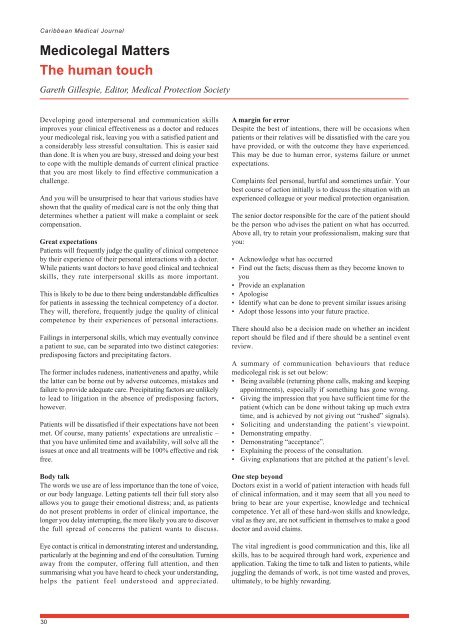Official Journal Of The Trinidad & Tobago Medical - the Trinidad and ...
Official Journal Of The Trinidad & Tobago Medical - the Trinidad and ...
Official Journal Of The Trinidad & Tobago Medical - the Trinidad and ...
You also want an ePaper? Increase the reach of your titles
YUMPU automatically turns print PDFs into web optimized ePapers that Google loves.
Caribbean <strong>Medical</strong> <strong>Journal</strong><br />
Medicolegal Matters<br />
<strong>The</strong> human touch<br />
Gareth Gillespie, Editor, <strong>Medical</strong> Protection Society<br />
Developing good interpersonal <strong>and</strong> communication skills<br />
improves your clinical effectiveness as a doctor <strong>and</strong> reduces<br />
your medicolegal risk, leaving you with a satisfied patient <strong>and</strong><br />
a considerably less stressful consultation. This is easier said<br />
than done. It is when you are busy, stressed <strong>and</strong> doing your best<br />
to cope with <strong>the</strong> multiple dem<strong>and</strong>s of current clinical practice<br />
that you are most likely to find effective communication a<br />
challenge.<br />
And you will be unsurprised to hear that various studies have<br />
shown that <strong>the</strong> quality of medical care is not <strong>the</strong> only thing that<br />
determines whe<strong>the</strong>r a patient will make a complaint or seek<br />
compensation.<br />
Great expectations<br />
Patients will frequently judge <strong>the</strong> quality of clinical competence<br />
by <strong>the</strong>ir experience of <strong>the</strong>ir personal interactions with a doctor.<br />
While patients want doctors to have good clinical <strong>and</strong> technical<br />
skills, <strong>the</strong>y rate interpersonal skills as more important.<br />
This is likely to be due to <strong>the</strong>re being underst<strong>and</strong>able difficulties<br />
for patients in assessing <strong>the</strong> technical competency of a doctor.<br />
<strong>The</strong>y will, <strong>the</strong>refore, frequently judge <strong>the</strong> quality of clinical<br />
competence by <strong>the</strong>ir experiences of personal interactions.<br />
Failings in interpersonal skills, which may eventually convince<br />
a patient to sue, can be separated into two distinct categories:<br />
predisposing factors <strong>and</strong> precipitating factors.<br />
<strong>The</strong> former includes rudeness, inattentiveness <strong>and</strong> apathy, while<br />
<strong>the</strong> latter can be borne out by adverse outcomes, mistakes <strong>and</strong><br />
failure to provide adequate care. Precipitating factors are unlikely<br />
to lead to litigation in <strong>the</strong> absence of predisposing factors,<br />
however.<br />
Patients will be dissatisfied if <strong>the</strong>ir expectations have not been<br />
met. <strong>Of</strong> course, many patients’ expectations are unrealistic –<br />
that you have unlimited time <strong>and</strong> availability, will solve all <strong>the</strong><br />
issues at once <strong>and</strong> all treatments will be 100% effective <strong>and</strong> risk<br />
free.<br />
Body talk<br />
<strong>The</strong> words we use are of less importance than <strong>the</strong> tone of voice,<br />
or our body language. Letting patients tell <strong>the</strong>ir full story also<br />
allows you to gauge <strong>the</strong>ir emotional distress; <strong>and</strong>, as patients<br />
do not present problems in order of clinical importance, <strong>the</strong><br />
longer you delay interrupting, <strong>the</strong> more likely you are to discover<br />
<strong>the</strong> full spread of concerns <strong>the</strong> patient wants to discuss.<br />
Eye contact is critical in demonstrating interest <strong>and</strong> underst<strong>and</strong>ing,<br />
particularly at <strong>the</strong> beginning <strong>and</strong> end of <strong>the</strong> consultation. Turning<br />
away from <strong>the</strong> computer, offering full attention, <strong>and</strong> <strong>the</strong>n<br />
summarising what you have heard to check your underst<strong>and</strong>ing,<br />
helps <strong>the</strong> patient feel understood <strong>and</strong> appreciated.<br />
30<br />
A margin for error<br />
Despite <strong>the</strong> best of intentions, <strong>the</strong>re will be occasions when<br />
patients or <strong>the</strong>ir relatives will be dissatisfied with <strong>the</strong> care you<br />
have provided, or with <strong>the</strong> outcome <strong>the</strong>y have experienced.<br />
This may be due to human error, systems failure or unmet<br />
expectations.<br />
Complaints feel personal, hurtful <strong>and</strong> sometimes unfair. Your<br />
best course of action initially is to discuss <strong>the</strong> situation with an<br />
experienced colleague or your medical protection organisation.<br />
<strong>The</strong> senior doctor responsible for <strong>the</strong> care of <strong>the</strong> patient should<br />
be <strong>the</strong> person who advises <strong>the</strong> patient on what has occurred.<br />
Above all, try to retain your professionalism, making sure that<br />
you:<br />
• Acknowledge what has occurred<br />
• Find out <strong>the</strong> facts; discuss <strong>the</strong>m as <strong>the</strong>y become known to<br />
you<br />
• Provide an explanation<br />
• Apologise<br />
• Identify what can be done to prevent similar issues arising<br />
• Adopt those lessons into your future practice.<br />
<strong>The</strong>re should also be a decision made on whe<strong>the</strong>r an incident<br />
report should be filed <strong>and</strong> if <strong>the</strong>re should be a sentinel event<br />
review.<br />
A summary of communication behaviours that reduce<br />
medicolegal risk is set out below:<br />
• Being available (returning phone calls, making <strong>and</strong> keeping<br />
appointments), especially if something has gone wrong.<br />
• Giving <strong>the</strong> impression that you have sufficient time for <strong>the</strong><br />
patient (which can be done without taking up much extra<br />
time, <strong>and</strong> is achieved by not giving out “rushed” signals).<br />
• Soliciting <strong>and</strong> underst<strong>and</strong>ing <strong>the</strong> patient’s viewpoint.<br />
• Demonstrating empathy.<br />
• Demonstrating “acceptance”.<br />
• Explaining <strong>the</strong> process of <strong>the</strong> consultation.<br />
• Giving explanations that are pitched at <strong>the</strong> patient’s level.<br />
One step beyond<br />
Doctors exist in a world of patient interaction with heads full<br />
of clinical information, <strong>and</strong> it may seem that all you need to<br />
bring to bear are your expertise, knowledge <strong>and</strong> technical<br />
competence. Yet all of <strong>the</strong>se hard-won skills <strong>and</strong> knowledge,<br />
vital as <strong>the</strong>y are, are not sufficient in <strong>the</strong>mselves to make a good<br />
doctor <strong>and</strong> avoid claims.<br />
<strong>The</strong> vital ingredient is good communication <strong>and</strong> this, like all<br />
skills, has to be acquired through hard work, experience <strong>and</strong><br />
application. Taking <strong>the</strong> time to talk <strong>and</strong> listen to patients, while<br />
juggling <strong>the</strong> dem<strong>and</strong>s of work, is not time wasted <strong>and</strong> proves,<br />
ultimately, to be highly rewarding.


